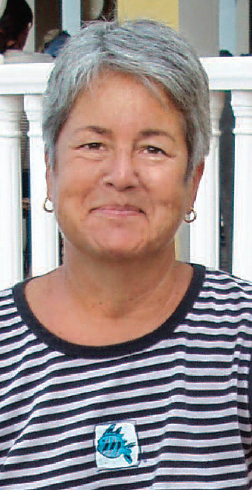Seniors Emergency Center: Mya's Story
 At age 67, Mya’s likely to be found scuba diving in the Caribbean. But just as a sudden storm can mean canceling a dive, a health emergency can cause a change in plans. One recent day, Mya experienced abdominal pain so serious she knew she needed to go to an emergency room.
At age 67, Mya’s likely to be found scuba diving in the Caribbean. But just as a sudden storm can mean canceling a dive, a health emergency can cause a change in plans. One recent day, Mya experienced abdominal pain so serious she knew she needed to go to an emergency room.
Mya came to a place that specializes in treating older adults: Holy Cross Hospital. There, she found attentive, respectful emergency care and an acute care program designed especially for older patients.
Not Your Usual Trip to the ER
The Seniors Emergency Center at Holy Cross Hospital is the first emergency facility in America specifically for older patients, and Mya noticed the difference the moment she arrived.
"They got me in quickly, started me on medications and arranged for a CT scan," she says.
She liked the quiet, private treatment bays which use walls instead of curtains to separate patients from the hustle and bustle and the amenities. "I had everything I needed including a TV and a telephone."
Yet she never felt alone or ignored. "I felt like people were taking care of me," she says.
Ace-ing the Transition
When Mya required additional treatment beyond the Seniors Emergency Center, she didn’t have to go far. Holy Cross Hospital’s Acute Care for Elders (ACE) program on the 5th floor medical unit specializes in treating and preventing health problems unique to older patients.
What makes the program unique: care plans tailored to patient needs and attention to detail at every step. For example, members of the care team are specially trained in areas important to the care of older patients, such as medication safety, pain management, bladder and bowel issues and skin conditions. They also practice compassionate listening and encourage socialization to ward off depression and delirium two high risk conditions for older patients.
Mya ended up staying at Holy Cross Hospital for a day and a half. “I was treated with utmost respect,” she says. “It was as one wishes a hospital wouldbe like.”
Continuing Care After Discharge
Mya left the hospital with a personalized discharge plan and received a follow up call the next morning. She was pleasantly surprised. "They were calling to see how I was doing."
"Hardly anyone wants to be in the hospital," Mya says. "I feel like if this happens again, there’s a caring place nearby."
